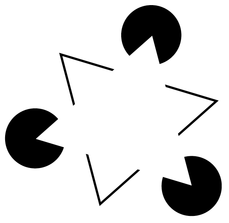
Gestalt Law of Closure states that individuals perceive objects such as shapes, letters, pictures, etc., as being whole when they are not complete. The truth is that we yearn for that completeness with just about everything in life, not just images. The greatest desire for this wholeness is in our relationships.
The hebrew word שלם (whole) has the same exact root of the word שלום (peace). Peace is not simply an absence of conflict. Peace can only exist when there is a sense of wholeness, an expression of oneness and completion.
This manifestation of peace can only be present after an active pursuit of this. That is why Judaism always speaks about שלום (peace) in the positive creation of such.
עשה שלום or יעשה שלום etc.
When this wholeness is missing from a relationship there is pain in its place. The pain of knowing that it could be and should be something more, something greater.
That pain is magnified tremendously when the relationship is lost. Even more so when the loss is permanent. When there is a void in a relationship with someone you love or care about there is always the thought that you should do something to remove that void. If that person dies and the gap was never closed the pain is overwhelming. So many children are left truly orphaned because they never told their parents how they really feel. Often brothers, sisters, cousins and friends are devastated being unable to mend a broken heart for a mistake sometimes long forgotten what it actually was. Sadly, spouses are left alone with the hollow space that had been long formed from an unwillingness to let the other one in and now it is to late.
We want the lines to be connected. We naturally desire to be whole. Don't wish for it, make it happen. Don't wait for the line to be permanently broken.
Say I'm sorry even if you don't remember why.
Say I love you, even though you don't know how to show it.
Attempt to make שלום (peace) today before it is to late.
The hebrew word שלם (whole) has the same exact root of the word שלום (peace). Peace is not simply an absence of conflict. Peace can only exist when there is a sense of wholeness, an expression of oneness and completion.
This manifestation of peace can only be present after an active pursuit of this. That is why Judaism always speaks about שלום (peace) in the positive creation of such.
עשה שלום or יעשה שלום etc.
When this wholeness is missing from a relationship there is pain in its place. The pain of knowing that it could be and should be something more, something greater.
That pain is magnified tremendously when the relationship is lost. Even more so when the loss is permanent. When there is a void in a relationship with someone you love or care about there is always the thought that you should do something to remove that void. If that person dies and the gap was never closed the pain is overwhelming. So many children are left truly orphaned because they never told their parents how they really feel. Often brothers, sisters, cousins and friends are devastated being unable to mend a broken heart for a mistake sometimes long forgotten what it actually was. Sadly, spouses are left alone with the hollow space that had been long formed from an unwillingness to let the other one in and now it is to late.
We want the lines to be connected. We naturally desire to be whole. Don't wish for it, make it happen. Don't wait for the line to be permanently broken.
Say I'm sorry even if you don't remember why.
Say I love you, even though you don't know how to show it.
Attempt to make שלום (peace) today before it is to late.
 RSS Feed
RSS Feed